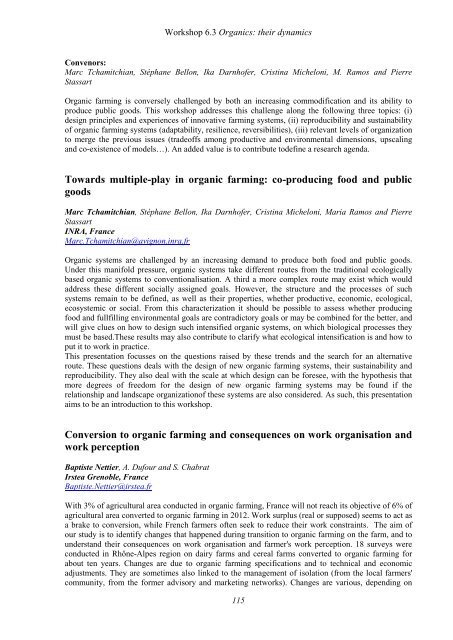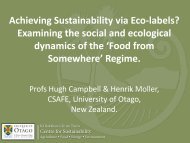Book of Abstract (incl. addendum) - IFSA symposium 2012
Book of Abstract (incl. addendum) - IFSA symposium 2012
Book of Abstract (incl. addendum) - IFSA symposium 2012
Create successful ePaper yourself
Turn your PDF publications into a flip-book with our unique Google optimized e-Paper software.
Workshop 6.3 Organics: their dynamics<br />
Convenors:<br />
Marc Tchamitchian, Stéphane Bellon, Ika Darnh<strong>of</strong>er, Cristina Micheloni, M. Ramos and Pierre<br />
Stassart<br />
Organic farming is conversely challenged by both an increasing commodification and its ability to<br />
produce public goods. This workshop addresses this challenge along the following three topics: (i)<br />
design principles and experiences <strong>of</strong> innovative farming systems, (ii) reproducibility and sustainability<br />
<strong>of</strong> organic farming systems (adaptability, resilience, reversibilities), (iii) relevant levels <strong>of</strong> organization<br />
to merge the previous issues (trade<strong>of</strong>fs among productive and environmental dimensions, upscaling<br />
and co-existence <strong>of</strong> models…). An added value is to contribute todefine a research agenda.<br />
Towards multiple-play in organic farming: co-producing food and public<br />
goods<br />
Marc Tchamitchian, Stéphane Bellon, Ika Darnh<strong>of</strong>er, Cristina Micheloni, Maria Ramos and Pierre<br />
Stassart<br />
INRA, France<br />
Marc.Tchamitchian@avignon.inra.fr<br />
Organic systems are challenged by an increasing demand to produce both food and public goods.<br />
Under this manifold pressure, organic systems take different routes from the traditional ecologically<br />
based organic systems to conventionalisation. A third a more complex route may exist which would<br />
address these different socially assigned goals. However, the structure and the processes <strong>of</strong> such<br />
systems remain to be defined, as well as their properties, whether productive, economic, ecological,<br />
ecosystemic or social. From this characterization it should be possible to assess whether producing<br />
food and fullfilling environmental goals are contradictory goals or may be combined for the better, and<br />
will give clues on how to design such intensified organic systems, on which biological processes they<br />
must be based.These results may also contribute to clarify what ecological intensification is and how to<br />
put it to work in practice.<br />
This presentation focusses on the questions raised by these trends and the search for an alternative<br />
route. These questions deals with the design <strong>of</strong> new organic farming systems, their sustainability and<br />
reproducibility. They also deal with the scale at which design can be foresee, with the hypothesis that<br />
more degrees <strong>of</strong> freedom for the design <strong>of</strong> new organic farming systems may be found if the<br />
relationship and landscape organization<strong>of</strong> these systems are also considered. As such, this presentation<br />
aims to be an introduction to this workshop.<br />
Conversion to organic farming and consequences on work organisation and<br />
work perception<br />
Baptiste Nettier, A. Dufour and S. Chabrat<br />
Irstea Grenoble, France<br />
Baptiste.Nettier@irstea.fr<br />
With 3% <strong>of</strong> agricultural area conducted in organic farming, France will not reach its objective <strong>of</strong> 6% <strong>of</strong><br />
agricultural area converted to organic farming in <strong>2012</strong>. Work surplus (real or supposed) seems to act as<br />
a brake to conversion, while French farmers <strong>of</strong>ten seek to reduce their work constraints. The aim <strong>of</strong><br />
our study is to identify changes that happened during transition to organic farming on the farm, and to<br />
understand their consequences on work organisation and farmer's work perception. 18 surveys were<br />
conducted in Rhône-Alpes region on dairy farms and cereal farms converted to organic farming for<br />
about ten years. Changes are due to organic farming specifications and to technical and economic<br />
adjustments. They are sometimes also linked to the management <strong>of</strong> isolation (from the local farmers'<br />
community, from the former advisory and marketing networks). Changes are various, depending on<br />
115











